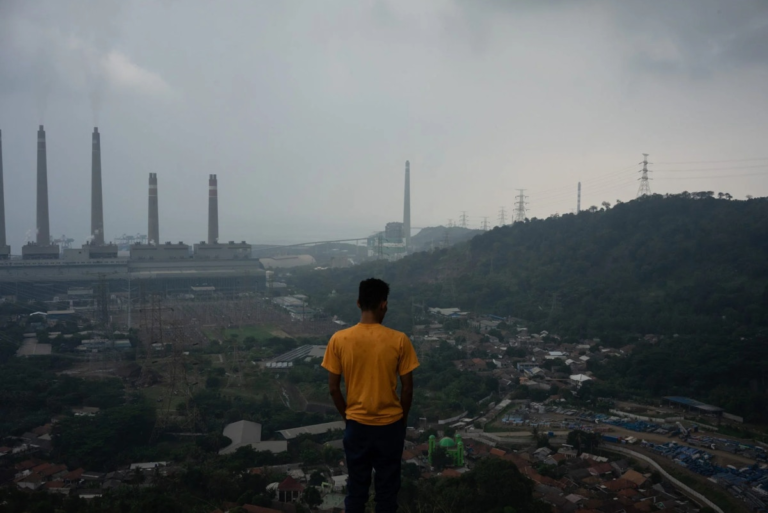The International Finance Corporation (IFC), the private lending arm of the World Bank Group, is under scrutiny over its investments in commercial banks that are financing the construction of two new coal-fired power plants at Indonesia’s Suraraya Power Plant.
The IFC’s internal watchdog, the Compliance Advisers Ombudsman (CAO), announced the investigation last Friday. Complaints In a lawsuit filed last September by residents of Indonesia’s Banten province, they claim the new nuclear plants, known as Java Units 9 and 10, will have devastating effects on their health, lives and the environment.
Java 9 and 10, currently under construction, will be a 2,000 megawatt (MW) expansion of the Suraraya power plant, one of the largest coal complexes in Southeast Asia. Indonesia, the region’s largest economy, is already the world’s third-largest coal producer and major coal consumer.
“It is encouraging that the CAO will conduct a thorough investigation, which brings us one step closer to justice,” said Sarah Jaffe, senior legal and policy officer at US-based non-profit Inclusive Development International (IDI).
“This project has transformed people’s lives and they deserve full and fair compensation for the damage they have suffered.”
“
It is encouraging that the CAO will conduct a thorough investigation, which brings us one step closer to justice.
Sarah Jaffe, Senior Legal and Policy Associate at Inclusive Development International
In the same CAO report, IFC management claimed that no violations of relevant environmental and social policies occurred in its transactions with its client, PT Bank KEB Hana Indonesia (Hana Bank), which is part of a consortium of commercial and public banks that funded the expansion of the Suraraya Coal Complex.
IFC noted that under its sustainability framework, it is not required to conduct environmental and social due diligence or directly oversee sub-projects of its financial intermediary clients.
According to the CAO’s initial assessment of the complaint, IFC has made equity investments worth $46.9 million in Hana Bank since 2007. The bank has also provided $56 million in loans to Java 9 and 10 developer PT Indo Raya Tenaga, representing about 2 percent of the total loan amount and about 1 percent of the total project cost.
The complaint was filed by civil society organisations, including IDI, Netherlands-based non-profit organisation Recourse, Indonesia-based Trend Asia and PENA Masyakarat, on behalf of residents of Suralaya village.
Construction of a new coal-fired power plant known as Jawa 9&10 is underway at the Suralaya Coal Complex in Banten, Indonesia. Image: Inclusive Development International
“Loopholes” in existing policy commitments to end coal funding
CAO’s research comes as part of a separate analysis published by IDI, Recourse and Trend Asia, which looked at the case of two coal-fired nickel smelters on Indonesia’s Ob island similarly funded by Hana Bank. The report said publicly funded multilateral development banks such as the World Bank risk “financing the expansion of captive coal operations in countries vulnerable to climate change, despite their commitments to shift finance from fossil fuels to renewable energy.”
Captive coal units, typically built to support industrial processes such as metals smelting and cement production, are set to become more common over the next decade.
In its CAO evaluation report, the watchdog questioned IFC’s management of the expected high risks associated with its investment in Hana Bank.
The report suggested IFC may have downplayed these risks by categorizing the investment as “medium” rather than “high” risk, and said IFC had failed over the years to ensure that known deficiencies in Hana Bank’s environmental and social management system were remedied.
“
We are providing our full support to the CAO during the compliance investigation and welcome a constructive dialogue with the CAO and other stakeholders while the CAO completes its compliance investigation.
IFC Spokesperson
However, in its report, IFC said any harm to local communities was “probably not linked” to potential non-compliance, given its “indirect and nominal exposure to Java 9 and 10” through Hana Bank.
In a statement to Ecobusiness, an IFC spokesperson said that while the organisation has an equity investment in Hana Bank, it is not directly supporting the construction of the Suralaya coal plant and is not involved in any stage of its development.
IFC added that documents shared by Hana Bank show that the Java 9 and 10 projects have been properly assessed, environmental and social risks and potential impacts have been identified, and environmental and social action plans have been agreed with the developer.
“We are providing our full support to the CAO during its compliance investigation and welcome a constructive dialogue with the CAO and other stakeholders while the CAO completes its compliance investigation,” the spokesperson said.
What are the weaknesses of IFC’s green equity approach?
Daniel Willis, financial campaigns manager at Recourse, described IFC’s failure to assess the huge coal projects funded by its clients against existing social and environmental policies as a “serious oversight failure”.
Last year, IFC updated its “Green Equity Approach” for intermediary clients such as commercial banks to make clear that its investments will no longer support new coal-fired power plants.
The policy previously only required financial clients to halve their exposure by 2025 and to eliminate it by 2030.
Financial intermediaries represent more than half of IFC’s investments, having received approximately US$40 billion in IFC support since May 2019.
Willis noted that this policy gap, which only allowed companies to cut their coal investments, has allowed IFC clients to support a number of large new coal projects over the past five years.
“IFC has said its ‘no new coal generation’ policy applies to all existing equity clients, but it is unclear whether and how this is being enforced in practice,” Willis added.
“By entrusting public funds to commercial banks that care more about profits than people, IFC has been found to be supporting huge coal projects that are unnecessary for our energy supply and devastating to the environment. IFC must work with the Ombudsman to remedy the harms identified in the investigation and make systemic changes to the way it invests in the future,” he said.


